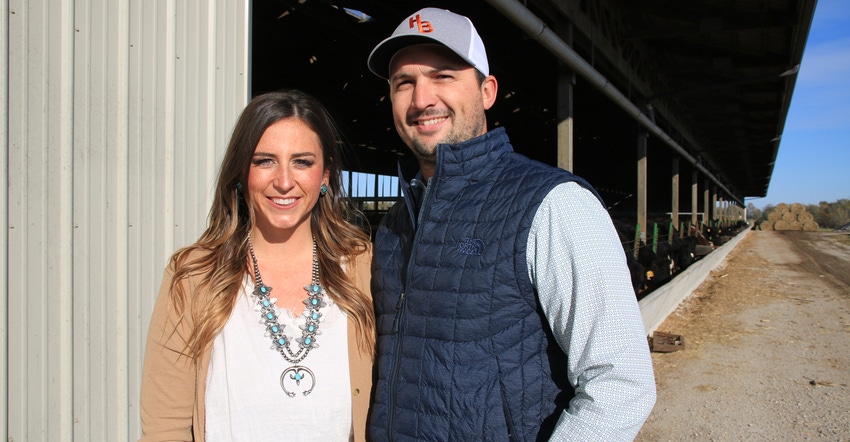
A new generation of Heads weathered an unusually wet 2019 season with diversification, endurance and guidance from the generations before them.
Reeder and Lena Head returned to the family farm, Head Bros. Land and Cattle, in 2014, with Reeder leaving a career as a seed salesman to eventually take over management of the row crop side of the operation in Blue Mound, Ill.
With more than 30 years’ experience farming as a grain and livestock producer, Malcolm Head made sure there was space for his sons, Reeder and Rollin, who is also a former seed salesman.
Malcolm started to transition management responsibilities to the brothers about two and a half years ago.
“He released the decision-making on the cattle side of the operation to Rollin and the grain side to me, but he’s still involved in both,” Reeder says, noting 2019 has been the bumpiest year of the transition due to weather. Like many Illinois farmers, he needed to replant a few acres on most of his fields.
“If I forget to do something, Dad lightly suggests we do X, Y or Z, but for the most part, he’s in the background and wants it that way,” Reeder adds. “We’re lucky he’s turned the reins over to us at a young age, while he’s still around to guide us.”
Reeder helps Rollin with the cattle when needed, especially during the winter when they’re calving the 450-plus cow-calf herd. They do embryo transfer work and calve out cows for clients.
Likewise, Rollin helps Reeder with crop farming, hauling grain and driving the grain cart on the 2,800-acre farm as needed.
“The division of responsibilities really falls down to how they manage each business unit, whereas with labor, everyone pitches in,” Lena says. Reeder and Lena met while attending the University of Illinois, where they both received their bachelor’s degrees in ag business. Lena works off-farm at GSI, a division of Agco, as a product manager for grain storage accessories.
“It’s nice to be able to leverage her corporate business perspective and see how we can apply those principles to grow our operation,” Reeder says. “We spend a lot of nights sitting around the kitchen table discussing strategies together and running numbers for different scenarios.”
Reeder aspires to increase on-farm storage in the future, but for now, they use older bins on existing farms and rent any extra space they need.
They use their current 180,000-bushel capacity to store corn for cattle feed and a diverse lineup of four different kinds of soybeans: non-GMO beans, non-GMO food-grade beans, Enlist seed beans and dicamba seed beans.
“Everything’s dried in the bin for now,” Reeder says. “We’ve talked about a dryer for the future, but what we can’t store ourselves, we pick that first and head into town. We pay for the drying and leave the rest of it in the field until it’s at 20% moisture. Then we put it in the bin and turn the fans on. It’s not ideal, I know, especially being married to a grain bin product manager.”
New faces
Reeder and Lena are members of the Cultivating Master Farmers program, a two-year schedule of gatherings between young farmers and Master Farmer award recipients sponsored by Farm Credit Illinois, Compeer Financial, Illinois Farm Bureau, Growmark, Bayer and Prairie Farmer.
They recently bought their first piece of land together through the Beginning Farmer Loan program offered by USDA and Farm Credit.
“We’ve been fortunate to have my dad and grandpa let us get involved and start to take more leadership in the operation,” Reeder says. “It’s nice to feel a sense of ownership in the work that we do.”
The couple looks at CMF as an opportunity to talk honestly with other Illinois farmers.
“There’s a lot you can learn from someone else’s operation, even if it’s nothing like yours — whether it’s different ways they’ve chosen to diversify or ways where they’ve found efficiencies,” Lena concludes.
About the Author(s)
You May Also Like




